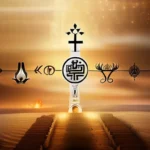Exploring the Distinctive Features of Judaism, Christianity, and Islam
This article delves into the unique aspects that set the oldest monotheistic religions apart. We will explore their origins, beliefs, practices, and cultural influences to gain a deeper understanding of these faiths.
The Origins of Monotheistic Religions
What Makes the Oldest Monotheistic Religion Unique?
Imagine stepping back into history, where the world was still finding its voice amidst the chaos of polytheism and the search for a singular, omnipotent deity. The origins of Judaism, Christianity, and Islam are like three rivers, each with their own unique flow but all tracing back to the same source—the quest for one God.
Let’s explore how Judaism, often considered the oldest of these monotheistic religions, carved out its path. Born in the cradle of civilization, the Fertile Crescent, Judaism was shaped by the covenant between God and Abraham, a promise that resonated through time like a sacred drumbeat. Could it be said that this covenant, etched in Leviticus, is what set the stage for monotheism’s enduring influence?
Now, picture the Romans as conquerors and the Pontius Pilate as a fleeting figurehead in history. The birth of Christianity emerged amidst this turmoil, with its roots deeply embedded in both Jewish beliefs and Roman political landscape. Could it be that Jesus’ message of love and salvation was seen as a challenge to the status quo, leading to its rapid spread despite persecution? How does one explain the transformative power of the resurrection, which became central to Christian doctrine?
Lastly, consider Islam’s emergence in 7th-century Arabia. With Muhammad receiving revelations through the angel Gabriel, Islam spread like wildfire across deserts and seas, unifying a diverse populace under its banner. Could it be that the simplicity of the Shahada, the Islamic declaration of faith, was instrumental in its rapid growth? And what role did The Quran play in shaping not just religious practice but also cultural and political life?
Each of these religions, with their distinct beliefs, practices, and texts, has left an indelible mark on human civilization. But it is the unique blend of history, geography, and key figures that makes each one unique—like three threads woven into a tapestry of monotheistic thought.
Core Beliefs and Practices
What makes the oldest monotheistic religion, Judaism, unique? To understand this question fully, we must delve into its core beliefs and practices, which are woven deeply into the fabric of Western civilization. Imagine a tree that has grown strong for millennia—its roots going deep into the soil of history while its branches reach out to embrace countless communities across the globe.
At the heart of Judaism lies the belief in one God, who is the sole creator and sustainer of the universe. This monotheistic concept, often referred to as El Elyon, or ‘God Most High,’ sets Judaism apart from polytheistic traditions where multiple deities were worshipped. Could it be that this singular belief system provided a foundation for future monotheistic religions like Christianity and Islam?
Jewish practices, such as the observance of Shabbat, dietary laws known as Kosher, and ritual prayer in synagogues, are deeply rooted in tradition. These practices serve not only as religious duties but also as a means to maintain cultural continuity. Can you imagine trying to navigate life without these familiar rituals? They provide a sense of stability amidst the ever-changing world.
The Torah, comprising both the Five Books of Moses and additional writings, stands at the center of Jewish religious texts. These sacred writings not only guide moral behavior but also outline historical events that shape the identity of the Jewish people. Is there a more profound way to connect with one’s heritage than through stories passed down for generations?
Judaism’s emphasis on ethics and social justice, as encapsulated in the commandments, challenges its followers to live in accordance with moral principles. Could it be that this focus on ethical living has influenced not only Jewish communities but also broader society? The concept of Tzedakah, or charity, encourages Jews to give back and support their community, reflecting a deep commitment to the well-being of others.
Through its unique blend of divine commandments and human traditions, Judaism offers a lens through which we can explore the essence of monotheism. As we continue our journey into the distinctive features of Christianity and Islam, one cannot help but wonder how these ancient teachings have shaped the world as we know it today.
Will you join us in this exploration to uncover the enduring legacy of Judaism and its profound impact on subsequent religious traditions? The path forward is both enlightening and revealing, inviting us to reflect on our own beliefs and practices.
Cultural Influences and Impact
How has the oldest monotheistic religion, Judaism, influenced art, literature, and philosophy over millennia? Consider the profound impact of Jewish traditions on Western culture, much like a river shaping its banks through constant flow. The Book of Exodus, with its narrative of liberation from bondage, has inspired countless works of art and literature, serving as a powerful metaphor for freedom and human rights. Think about how many famous paintings or novels have drawn upon this story to convey themes of oppression and redemption.
The Talmud, rich in legalistic and philosophical discussions, has shaped Jewish thought and influenced broader philosophical discourse on ethics and morality. Could it be that these texts have indirectly shaped the very way we think about right and wrong? The concept of mitzvot, or commandments, not only governs daily life but also inspires ethical behavior, much like a compass guiding a ship through stormy seas.
Judaism’s influence on literature is evident in works such as Shakespeare’s The Merchant of Venice, where the character Shylock serves as a complex reflection of Jewish heritage and identity. Similarly, authors like Herman Melville used Jewish themes to explore deeper existential questions in his work. How does Judaism’s emphasis on tradition and history resonate with these literary explorations?
In societal structures, Jewish communities have often established their own social and legal frameworks, such as the Halakha, which governs virtually all aspects of life. This system has not only shaped Jewish society but also provided a model for other religious or ethnic groups to develop similar systems. How do these communal structures compare with those found in other monotheistic religions?
The influence of Judaism extends beyond religious boundaries, affecting art and philosophy as well. Think about the impact of Jewish artists like Marc Chagall, whose work often reflects mystical themes from his faith. Could it be that these artistic expressions have helped bridge the gap between different cultures and beliefs? The metaphorical weight of Jewish history, with its cycles of oppression and resilience, has left an indelible mark on Western civilization.
From The Haggadah to contemporary debates in secular society, Judaism’s cultural contributions are vast and varied. How do you see the legacy of this ancient faith shaping modern thought and practice? The river of Jewish tradition continues to flow, nourishing countless lives with its wisdom and inspiration.
In exploring these questions, we uncover a rich tapestry of influence that highlights the unique role Judaism plays in human history. Whether through art, literature, or societal structures, the oldest monotheistic religion has left an enduring impact on our world, much like a tree whose roots stretch deep into the ground and branches reach far into the sky.
The Role of Monotheism in Politics
What makes the oldest monotheistic religion, Judaism, stand out among its peers? Could it be the profound impact it had on the political landscape, shaping empires and influencing modern nation-states? The roots of Judaism are deeply intertwined with governance and law. From the time of King David to the establishment of Israel in the 20th century, the religion has consistently played a pivotal role in political systems.
Imagine a tree whose branches stretch far and wide, symbolizing the influence of Judaism on various societies. The trunk of this tree is strong and ancient, representing Judaism’s longevity and steadfast principles. One branch could be seen reaching towards Rome, where the concept of governance based on ethical monotheism found a fertile ground during the Roman Empire. Another might extend to Byzantium, where Jewish philosophers contributed to the legal framework that influenced later European societies.
The rise and fall of empires under the influence of Judaism provide a fascinating narrative. For instance, consider how the Bar Kokhba revolt in the 2nd century against the Roman Empire was not just a fight for freedom but also a struggle rooted in religious identity. This event highlighted the political resilience and communal strength embedded within Judaism. Similarly, during the Middle Ages, Jewish communities often served as intermediaries between various rulers and subjects, playing crucial roles in local governance.
Fast forward to modern times, where the formation of Israel in 1948 marked a significant milestone. The establishment of this nation-state was deeply influenced by Judaism, blending religious identity with political sovereignty. This blend continues to shape ongoing debates and challenges, as seen in the Israeli-Palestinian conflict today.
Reflecting on these historical and contemporary contexts, it becomes clear that Judaism’s unique role extends beyond religious beliefs into the very fabric of political systems. Its principles of justice, ethics, and communal responsibility have left an indelible mark, shaping not just individual lives but entire civilizations.
Contemporary Challenges and Adaptations
How do Judaism, Christianity, and Islam navigate the challenges of modernity? These ancient religions, each with over two millennia of history, face unprecedented pressures from secularization, globalization, and religious pluralism. Imagine these traditions as mighty trees that have weathered countless storms; now, they must adapt to an ever-changing landscape.
Secularization poses a significant challenge, particularly in Western countries where state and church separation is the norm. How do these religions maintain their relevance without direct governmental support? Some argue that by engaging with scientific advancements and ethical dilemmas of our time, they can find new grounds for dialogue. For instance, environmental ethics could become a common ground between religion and science.
Globalization brings both opportunities and obstacles. On one hand, it exposes these religions to a wider audience, potentially attracting followers from diverse backgrounds. On the other hand, it also exposes them to criticism and scrutiny not seen before. How do they balance traditional teachings with the rapid changes around the world? Can these religions redefine themselves while preserving their core beliefs?
Religious pluralism challenges these monotheistic traditions to coexist peacefully with others. Historically, these religions have often clashed over dominance. Now, living in a multicultural society where multiple belief systems are present, how do they promote tolerance and understanding? Can they learn from each other’s practices of interfaith dialogue and cooperation?
The key may lie in their adaptability. Just as the roots of an old tree spread to find water and nutrients, these religions must seek new sources of spiritual nourishment that resonate with modern souls. By embracing change, these ancient faiths can continue to thrive, not just survive.
The Future of Monotheistic Religions
What makes Judaism, the oldest monotheistic religion, unique? Is it its rich history spanning thousands of years, from ancient Mesopotamia to modern-day synagogues? Or perhaps its unwavering focus on a single deity that sets it apart from many other belief systems? Judaism is like an old oak tree—strong, rooted deeply in tradition while still managing to bend with the winds of change. As we look to the future, how will this ancient religion evolve?
One key factor shaping its future could be demographics. With global Jewish populations distributed across continents, from Israel to North America and Europe, demographic shifts may influence religious practices and community dynamics. Will younger generations embrace traditional teachings or seek new ways of expressing their faith? It’s akin to asking how a sapling will grow under different soil conditions.
Technology is another disruptive force. Virtual synagogues and digital learning platforms are making Judaism more accessible than ever before. How might this impact the role of physical spaces like synagogues in the future? Will virtual engagement lead to a deeper or shallower connection with tradition? The answer could shape the very essence of what it means to be Jewish in the 21st century.
Cultural shifts, too, play a significant role. As societies become more diverse and secular, how will Judaism adapt its outreach efforts to attract non-traditional members? Can it embrace new cultural expressions while maintaining core beliefs? It’s like trying to navigate an ancient map with modern coordinates—no small feat.
The future of Judaism is not just about survival but thriving. It will be interesting to see how this religion continues to redefine itself in the face of global challenges, technological advancements, and cultural transformations. Will it remain a pillar of monotheistic thought or evolve into something unrecognizable? Only time will tell, and perhaps that’s what makes the future so exciting.
Conclusion
 By examining the distinctive features of Judaism, Christianity, and Islam, we have gained valuable insights into the rich history and diversity of monotheistic religions. We hope this article has enriched your knowledge and appreciation for these ancient faiths.
By examining the distinctive features of Judaism, Christianity, and Islam, we have gained valuable insights into the rich history and diversity of monotheistic religions. We hope this article has enriched your knowledge and appreciation for these ancient faiths.











